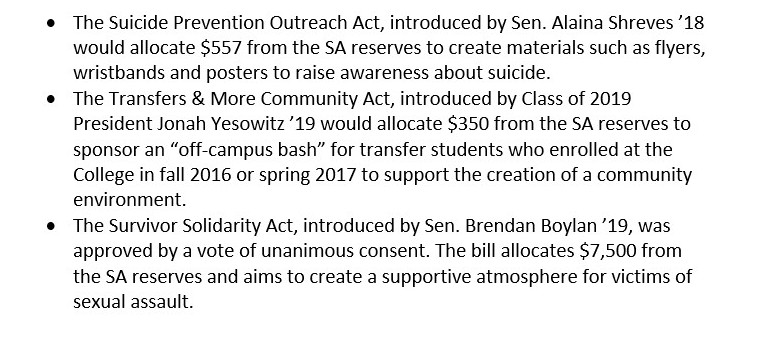During Tuesday’s Student Assembly meeting, senators discussed and passed a bill that follows their Feb. 7 resolution codifying the senate’s response to sexual assault on campus.
The Survivor Solidarity Act, sponsored by Sen. Brendan Boylan ’19, is the second piece of legislature presented in the past month that deals with the topic of sexual assault on campus. Boylan introduced the Survivor Solidarity Resolution Jan. 31 to call attention to the issue of sexual assault on the College of William and Mary’s campus. Boylan said that introducing a resolution and a bill helps to solidify SA’s dedication to stopping sexual violence.
After committee discussions, senators voted to revise the resolution and Tuesday’s bill. According to Boylan, a key focus of the Survivor Solidarity Act is to create a discussion-based roundtable where student groups can meet to discuss sexual assault on campus.
The roundtable would then report back to the senate so that SA could potentially provide additional resources. Edits to the bill made Feb. 21 allow a SA representative to take part in the roundtable. Boylan said that the editing process helped to ensure that the senate found a balance between ensuring their involvement in a potential roundtable of student organizations and protecting the independence of such a roundtable.
We wanted to make sure that every word was proper and right,” Boylan said.
“We wanted to make sure that every word was proper and right,” Boylan said. “Now we have a Student Assembly representative [attending the roundtable discussions] and that just ensures that Student Assembly can at least play a role, at least a nominal role, if not be a facilitator in those discussions.”
The bill allocates $7,500 from the SA reserves to cover a speaking fee for the End Rape on Campus organization so students can be provided with “information on how to act effectively as supporters of survivors.” The event would be held during the week of April 13.
Additionally, the bill requests that the College asks individuals seeking employment to disclose former misconduct investigations involving them and then terminate employees who incorrectly disclose such information. The bill also states SA’s support of a new sex crime reporting system.
The resolution passed Feb. 7 also went through revisions and entire lines were re-written. One line that senators disagreed on in the original version of the resolution read, “[This bill] [d]eclares that current Administration policies, especially poorly and inconsistently enforced no-contact orders, make the College complicit in these vicious crimes against our fellow classmates.”
The resolution aims to provide SA’s written support of victims of sexual assault, declare that SA will no longer associate with perpetrators of sexual assault while “lauding” the students who created the Haven, criticize the College’s Task Force on Sexual Assault as being “inadequate” in supporting victims and lastly, to support the College in permanently expelling perpetrators of sexual assault.

Many senators said that they believed it unnecessarily implicated the College in crimes of sexual assault when instead it should only be held accountable for not having a stronger stance against the crime.
The resolution was amended to read, “[This bill] [d]eclares that on account of current Administration policies, including poorly and inconsistently enforced no-contact orders, there is a demand for improvement of such policies to ensure the College is committed to alleviating the effects of these crimes against our fellow classmates.”
Chairman of the Senate Danny O’Dea ’18 said that he felt some of the lines of the original resolution that called the College complicit in issues of sexual assault were too extreme.
I don’t think we want to use this language, it’s implying quite a lot and saying the College specifically did these things,” O’Dea said.
“I don’t think we want to use this language, it’s implying quite a lot and saying the College specifically did these things,” O’Dea said. “I’m not comfortable with this. They could definitely do better, but they’re not complicit.”
Class of 2017 President Emily Thomas ’17 spoke in support of the Survivor Solidarity Act but questioned whether it was possible support the roundtable committee for future years without needing to write similar legislation.
“We are somehow saying that we want this to committee to carry on past the 324 [session of] senate,” Thomas said. “The question is; how do we do that?”
Class of 2019 President Jonah Yesowitz ’19 suggested creating a second bill to accompany the Survivor Solidarity Act that, if passed, would automatically allow the bill to carry on for future sessions of SA.
“This idea of a new bill would potentially allow this bill to renew every year and continue the roundtable,” Yesowitz said. “It would easily solve that problem.”
While no action was taken on a potential second bill, the Survivor Solidarity Act was passed by a vote of unanimous consent. Boylan said that he thinks creating the roundtable opens the campus up to dialogue on the issue and that SA can have an integral role in the fight against sexual assault.
“There are specific problem areas in our community and we need to be able to recognize and act upon them, whether it’s with Greek life, athletics, the LGBTQ community, all the groups here,” Boylan said. “I believe that Student Assembly can play an instrumental role in alleviating those problems, in being able to support survivors as well as preventing sexual assault from happening in general.”
2/24/2017 12:03 a.m. An earlier version of this article incorrectly attributed a quote from Chairman of the Senate Danny O’Dea ’18 to Sen. Mitch Croom M.A. ’17.

